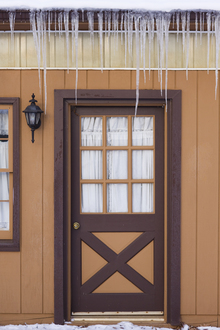In their latest press release, Equine Guelph has suggestions for keeping horses healthy during cold weather when they are spending more time in barns and stables.

Promoting better horse health in cold weather
With shelter from the wind and elements and access to fresh water and good quality hay, most horses can live quite comfortably surrounded by their companions without a stable.
Horses are designed to live outside. With shelter from the wind and elements and access to fresh water and good quality hay, most horses can live quite comfortably surrounded by their companions without a stable.
This is not always a convenient option for their human counterparts.
What you can do to improve air quality in your stable
Fresh air without drafts will go a long way to minimizing a horses exposure to harmful environmental irritants. A combination of inlets (ie vents) and outlets (ie cupolas) help provide ventilation especially once barn windows and doors are closed up to provide warmth in the winter.
Mechanical ventilation is another consideration. Insulation minimizes temperature fluctuations caused by warm days and cold nights. Proper insulation not only keeps the barn warm in the winter but when combined with good ventilation, a barn will avoid condensation problems which can make for cold, clammy and damp conditions.
Bedding
Choose high quality, absorbent bedding with low dust levels. If you can smell ammonia, your horseâs airways are at risk. Ammonia can also increase mucus production. More turn out time equals less urine in the stall. Daily, proper cleaning of stalls is of course a must and use of an ammonia control product can prove useful in eliminating this noxious gas.
It is recommended to turn out horses prior to cleaning the stable as bedding is the 2nd most common source of dust in the barn. Savvy stable workers wet down floors before sweeping and also wear a dust mask.
Drainage
Floors that allow urine to be absorbed and travel down through the flooring material layers can suffer from odor retention. Non porous floors depend on slope for drainage and/or adequate bedding to soak up urine.
